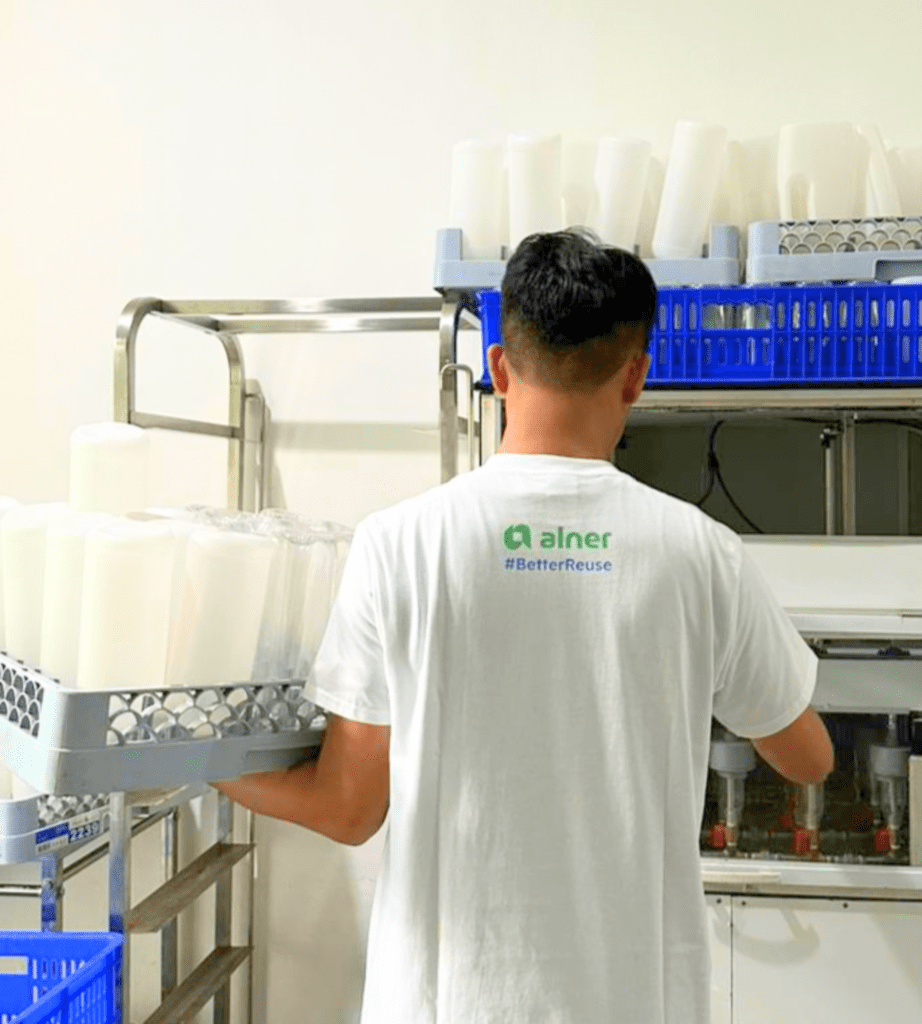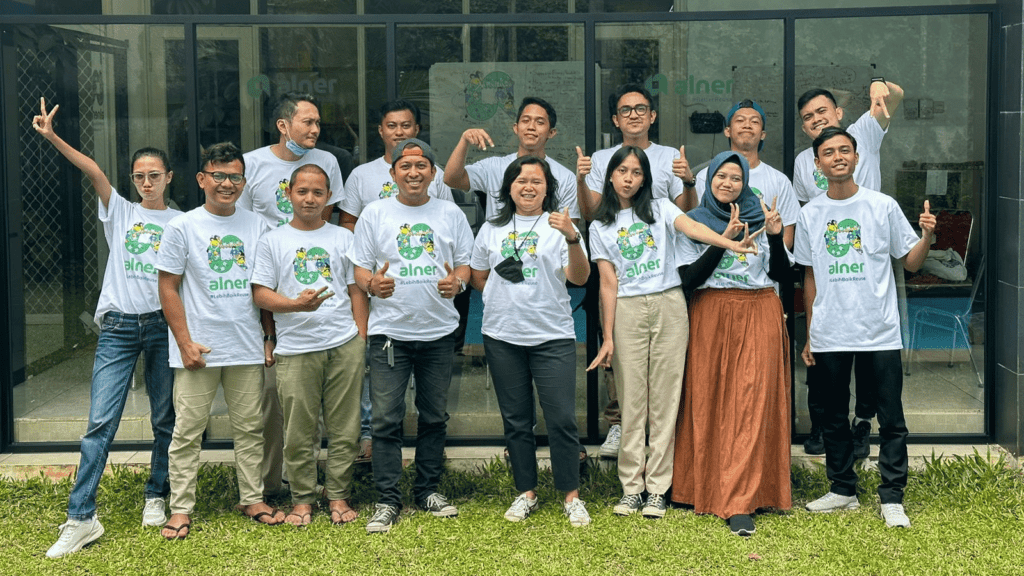Rebranded from Koinpack to Alner, the Enviu venture is Indonesia’s first returnable and reusable packaging system provider for consumer goods such as detergent, shampoo, and food products.
“Is it a cryptocurrency?”
“How do you spell it?
“What is Coinpack?”
What started as a brand name to symbolize the monetary incentive for reusable and returnable packaging, gradually grew into intriguing questions, such as the above. And so, after nearly three years, Koinpack in Indonesia is being rebranded. Koinpack is now Alner. It all started when the Koinpack team, spearheaded by the founder and Chief Executive Officer (CEO) Bintang Ekananda, conducted periodic consumer feedback. It soon prompted rebranding research.
RELEVANT SUSTAINABLE GOALS


“People had a hard time pronouncing or remembering the name. Some thought we offer crypto or financial services, while others mistook us for KoinWorks (the financial app in Indonesia),” recalls Bintang, adding that rebranding was already in their pipeline. The more significant push for rebranding was the growing number of consumers — both middle- and low-income — for their reusable packaging.

After intensive testing with sales points and consumers, Alner emerged as the winner.
In an interview, Bintang Ekananda explains what Alner signifies, and the objective of rebranding. He also shares some of his most challenging moments as an entrepreneur in the last three years, while retracing why Alner was started in the first place.
What does the name Alner mean, and signify?
The name ‘Alner’ is a combination of two words: ‘alternative’ and ‘container.’ Alternative means ‘another option,’ while the container is a place or tool to pack goods. Thus, Alner is an alternative way to use containers that are generally disposed of after single use. Alner allows brands and consumers to use these containers multiple times, reducing single-use packaging waste.
What is the ultimate goal of the new brand name?
With the new name and logo, we aim to be more relevant to our expanded target audience and align with our core mission to provide an alternative container system to reduce plastic pollution. The new name and logo will better represent what we do. Moreover, with a shorter name, it will be striking, brandable, and easier to find on search engines. Besides, since we are growing fast, it is a good moment to rebrand.
What is Alner’s story?
Indonesia produces 6.8 million tonnes of plastic waste annually, and only about 10% is recycled. Around 4.8m tonnes of waste are mismanaged, of which, single-use flexible packaging such as sachets and pouches make up ~76%. Single-use flexibles are hard to recycle because they are small, hard to collect, and contain layers of materials that are difficult to separate. Consequently, these materials are leaking into and polluting our environment.
Alner is Indonesia’s first returnable and reusable packaging system provider for consumer goods such as detergent, shampoo, and food products. It was started in March 2020 using a reward model to replace single-use flexible packaging.
The reuse system will fully integrate with existing brands selling fast-moving consumer goods (FMCGs). With the COVID-19 pandemic, we expanded our solutions from offline to online channels, allowing customers to purchase directly from Alner via online platforms.
How does Alner work for consumers and brands?
- Alner supplies reusable packaging to FMCGs.
- FMCGs fill their products in Alner packaging.
- Customers buy the finished goods from community-based points of sale (PoS) such as waste banks, warung (convenience) stores, and peer-to-peer sellers or directly from Alner via online platforms. If they buy through a PoS, the packaging will be scanned by the PoS using the Alner online channels to track it digitally.
- Customers use their products, and return the empty packaging to the same PoS they bought from. If they buy directly from Alner, they can swap it with pre-filled packaging in the next purchase.
- Customers receive a cashback on the next purchase, as a token of appreciation for their reuse habit. The cashback ranges from $0.08-0.65 per packaging returned, depending on its size (100 ml to 5 liters).
- Alner collects the empty packaging at the PoS, restocks, cleans, and provides them again to the FMCGs.
There are a few global reusable and returnable packaging start-ups, such as Bumerang, Cuploop, etc. How is Alner different?
The greatest difference is that both environmental and social impact go hand-in-hand. There are other aspects, too, that make our offering different.
One, Alner makes the reuse system affordable. With our model, our low-income consumers can get their essential products 5-10% cheaper upon the packaging return. Two, Alner provides an economically attractive opportunity for our PoS. They can increase their earnings by 10-15% per month. Three, Alner’s system is convenient. Our PoS, also as drop-off points, are widely available at the neighborhood level and are accessible to low-income consumers, too. This will increase the adoption rate of our reuse solution.
We also believe that tech innovation drives sustainable business with convenience. For Alner, we use a “packaging as a service” model. We provide FMCGs with reusable bottles, which the latter fill with their own products. We then sell the filled bottles to PoS and consumers, arrange for the empty bottles to be returned, provide the reverse logistics, and handle the cleaning of the bottles. This model is revenue-generating and will become self-sustaining for Alner.
To ensure cleaning quality, we developed a cleaning procedure using a semi-automated machine and specific cleaning agents to avoid contamination. We then conduct a laboratory test to ensure the rate of microorganisms in the packaging is negative or zero.
Our packaging is made with durable PET, PP, or HDPE, designed to be reused 10-20 times. The QR Code system on our packaging enables FMCGs to track and cycle their lifespans, which is crucial to determining affordability.
What are Alner’s progress and achievements so far?
Since 2020, Alner has expanded to 100+ PoS, including community-based PoS such as waste banks, warung stores, peer-to-peer agents in Greater Jakarta, and online channels. We have sold 40,000+ products to 2,500+ customers and avoided 400,000+ flexible packaging.
Our potential has already caught the eye of FMCGs that see the opportunity in this model. FMCGs working with us prove that our model is viable and scalable. We are currently collaborating with three FMCGs, including Wipro Unza, Barco, and Yagi Natural. More partnerships are underway.
Alner has also received several recognitions: Winner of the Technology Innovation Challenge (TIC) on Healthy Oceans – Prevent Plastic Waste; Forbes 30 Under 30 Asia-Social Impact List for the CEO; and IKEA Social Entrepreneurship 2022.
The TIC is a 450,000 USD grant awarded to a high-level technology solution to address an identified development challenge. Alner will use the TIC grant to develop its technology further. The TIC grant will be truly catalytic in enabling Alner’s expansion ambitions to 1,500+ Points of Sales and preventing 200m+ single-use packaging by 2024.
Could you recall the toughest moment in the journey so far?
In the very early days of our pilot, I would go door to door to the warung stores to convince them to be our PoS.
It’s not just about asking stores to sell more sustainable products to their customers but also about how our solution benefits them.
For example, as the end-users get a cashback when they return our empty packaging, consumers become more loyal to their warung stores, which eventually increases the store’s earnings.
It took around two weeks to convince our first two warung stores in Kebon Jeruk, West Jakarta. I was shadowing the warung owners, observing what they do and what they truly need. Besides promoting our sustainable products, they also needed a reasonable profit margin for selling our products, and other benefits, such as a clear restocking process, promotion materials, and good customer service.
What is Alner’s roadmap for 2023?
In 2023, we aim to scale our solution and impact 10 times more. We aim to work with 500 PoS, 5+ FMCGs, sell 490,000+ products, and avoid 4.9m flexible packaging. To do this, we will develop our sales force, equipped with the tools and narrative to acquire and train new PoS and onboard new FMCGs.
We will ramp up marketing, and finetune the branding to build awareness and make reuse easier to understand and attractive. Alner will keep working with local governments to onboard their waste bank networks as our PoS. We will develop and launch new product categories and loyalty programs to increase the end consumers’ basket size and loyalty.
By 2024, Alner aims to work with more than 1,500 PoS, sell 2 million products, and avoid 200 million flexibles with a revenue of $2.7M, reaching break-even. We also plan to expand within Asia to relevant markets.
You may also be interested in :
Circularity Gap Report 2023 : “We Live In The Overshoot Era”



